After Eric Garner died following a confrontation with New York City police five years ago, one officer involved in the struggle wrote up paperwork that exaggerated the seriousness of the dead man's suspected crime, according to testimony Tuesday.
Officer Justin Damico testified that after riding in an ambulance with the dying Garner, he went ahead on his own and filled out arrest papers listing a felony tax charge that would have required prosecutors to prove Garner, a small-time street hustler, had sold 10,000 untaxed cigarettes.
Damico spoke at the police department disciplinary trial for Daniel Pantaleo, the officer accused of placing Garner in a banned chokehold as they attempted to arrest him for selling loose, untaxed cigarettes near a Staten Island park in July 2014.
"You initiated this on your own, writing up the arrest of a dead man?" asked Suzanne O'Hare, a lawyer for the police watchdog agency bringing the disciplinary case.
Damico acknowledged that the felony charge was incorrect because Garner actually had with him five packs of Newports that contained a total of less than 100 cigarettes. The cigarettes were marked for sale in Virginia, a telltale sign that they were being resold illegally in New York.
Garner was ultimately charged with two misdemeanors, which alleged that he resisted arrest and sold untaxed cigarettes. The case was not prosecuted because Garner died.
The confrontation with Garner was partially caught on a bystander's cellphone video, ending with Pantaleo grabbing Garner and pulling him to the ground. Garner's dying pleas of "I can't breathe" became a rallying cry against police brutality.
Pantaleo, 33, denies wrongdoing. He has been on desk duty since Garner's death.
Testifying for more than an hour Tuesday, Damico told a nearly full hearing room at police headquarters that he'd given an agitated Garner a warning two weeks before the confrontation.
Damico said he and Pantaleo allowed Garner to vent for about 10 minutes before moving to arrest him because they were reluctant to use physical force.
And he testified that he did see Pantaleo's arm around Garner's neck as the two men struggled — but he didn't say if he thought the move was a chokehold.
Until Tuesday, Damico had never spoken publicly about the case.
Damico testified that he and Pantaleo tried to be patient as Garner screamed that he was tired of continually being harassed by police. They stayed calm even as Garner swatted Damico's hands away and refused to be arrested.
Damico and Pantaleo "utilized textbook de-escalation techniques to limit the use of force against a much larger and irate individual," said Pat Lynch, the president of the union representing officers, the Police Benevolent Association.
"We are convinced that if the politics of the streets are removed from this process and the case is decided on a dispassionate hearing of the facts, that Police Officer Pantaleo will be exonerated," Lynch said.
The NYPD's disciplinary process plays out like a trial in front of an administrative judge.
Normally the purpose is to determine whether an officer violated department rules, but that's only if disciplinary charges are filed within 18 months of an incident.
Because Pantaleo's case languished, the watchdog Civilian Complaint Review Board must show that his actions rose to the level of criminal conduct, even though he faces no criminal charges and is being tried in a department tribunal, not a criminal court.
The final decision on any punishment lies with the police commissioner. Penalties range from the loss of vacation days to firing.
The disciplinary hearing is scheduled to resume June 5.
Pantaleo's lawyers say they will call a medical examiner from St. Louis to rebut the New York medical examiner's finding that a chokehold set into motion "a lethal sequence of events" for Garner.
Garner's family said it's tired of the delays.
This story has been corrected to show that the last name of the officer who testified is Damico, not D'Amico.
UNITED NATIONS (AP) — The United States vetoed a widely backed U.N. resolution Thursday that would have paved the way for full United Nations membership for Palestine, a goal the Palestinians have long sought and Israel has worked to prevent.
The vote in the 15-member Security Council was 12 in favor, the United States opposed and two abstentions, from the United Kingdom and Switzerland. U.S. allies France, Japan and South Korea supported the resolution.
The strong support the Palestinians received reflects not only the growing number of countries recognizing their statehood but almost certainly the global support for Palestinians facing a humanitarian crisis caused by the war in Gaza, now in its seventh month.
The resolution would have recommended that the 193-member U.N. General Assembly, where there are no vetoes, approve Palestine becoming the 194th member of the United Nations. Some 140 countries have already recognized Palestine, so its admission would have been approved, likely by a much higher number of countries.
U.S. deputy ambassador Robert Wood told the Security Council that the veto “does not reflect opposition to Palestinian statehood but instead is an acknowledgment that it will only come from direct negotiations between the parties."
The United States has “been very clear consistently that premature actions in New York — even with the best intentions — will not achieve statehood for the Palestinian people,” deputy State Department spokesman Vedant Patel said.
His voice breaking at times, Palestinian U.N. Ambassador Riyad Mansour told the council after the vote: “The fact that this resolution did not pass will not break our will and it will not defeat our determination.”
“We will not stop in our effort,” he said. “The state of Palestine is inevitable. It is real. Perhaps they see it as far away, but we see it as near.”
This is the second Palestinian attempt for full membership and comes as the war in Gaza has put the more than 75-year-old Israeli-Palestinian conflict at center stage.
Palestinian President Mahmoud Abbas first delivered the Palestinian Authority’s application for U.N. membership in 2011. It failed because the Palestinians didn’t get the required minimum support of nine of the Security Council’s 15 members.
They went to the General Assembly and succeeded by more than a two-thirds majority in having their status raised from a U.N. observer to a non-member observer state in 2012. That opened the door for the Palestinian territories to join U.N. and other international organizations, including the International Criminal Court.
Algerian U.N. Ambassador Amar Bendjama, the Arab representative on the council who introduced the resolution, called Palestine’s admission “a critical step toward rectifying a longstanding injustice" and said that “peace will come from Palestine’s inclusion, not from its exclusion.”
In explaining the U.S. veto, Wood said there are “unresolved questions” on whether Palestine meets the criteria to be considered a state. He pointed to Hamas still exerting power and influence in the Gaza Strip, which is a key part of the state envisioned by the Palestinians.
Wood stressed that the U.S. commitment to a two-state solution, where Israel and Palestine live side-by-side in peace, is the only path for security for both sides and for Israel to establish relations with all its Arab neighbors, including Saudi Arabia.
“The United States is committed to intensifying its engagement with the Palestinians and the rest of the region, not only to address the current crisis in Gaza, but to advance a political settlement that will create a path to Palestinian statehood and membership in the United Nations,” he said.
Mansour, the Palestinian U.N. ambassador, reiterated the commitment to a two-state solution but asserted that Israel believes Palestine "is a permanent strategic threat."
"Israel will do its best to block the sovereignty of a Palestinian state and to make sure that the Palestinian people are exiled away from their homeland or remain under its occupation forever,” he said.
He demanded of the council and diplomats crowded in the chamber: “What will the international community do? What will you do?”
Israeli-Palestinian negotiations have been stalled for years, and Israel’s right-wing government is dominated by hard-liners who oppose Palestinian statehood.
Israeli U.N. Ambassador Gilad Erdan called the resolution “disconnected to the reality on the ground” and warned that it “will cause only destruction for years to come and harm any chance for future dialogue.”
Six months after the Oct. 7 attack by the Hamas militant group, which controlled Gaza, and the killing of 1,200 people in “the most brutal massacre of Jews since the Holocaust,” he accused the Security Council of seeking “to reward the perpetrators of these atrocities with statehood.”
Israel’s military offensive in response has killed over 32,000 Palestinians, according to Gaza’s health ministry, and destroyed much of the territory, which speaker after speaker denounced Thursday.
After the vote, Erdan thanked the United States and particularly President Joe Biden “for standing up for truth and morality in the face of hypocrisy and politics.”
He called the Palestinian Authority — which controls the West Bank and the U.S. wants to see take over Gaza where Hamas still has sway — “a terror supporting entity.”
The Israeli U.N. ambassador referred to the requirements for U.N. membership – accepting the obligations in the U.N. Charter and being a “peace-loving” state.
“How can you say seriously that the Palestinians are peace loving? How?” Erdan asked. “The Palestinians are paying terrorists, paying them to slaughter us. None of their leaders condemns terrorism, nor the Oct. 7 massacre. They call Hamas their brothers.”
Despite the Palestinian failure to meet the criteria for U.N. membership, Erdan said most council members supported it.
“It’s very sad because your vote will only embolden Palestinian rejectionism every more and make peace almost impossible,” he said.
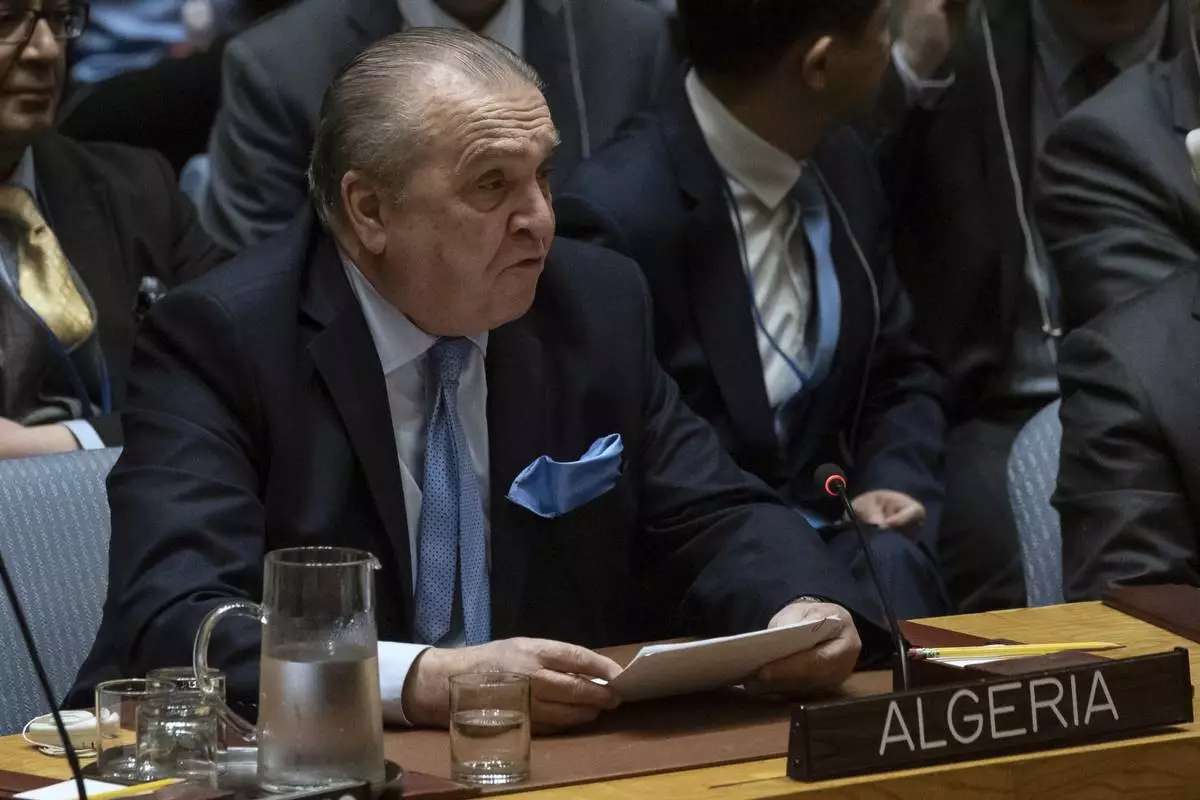
Algeria's Permanent Ambassador to the United Nations Amar Bendjama speaks during a Security Council meeting at United Nations headquarters, Thursday, April 18, 2024. (AP Photo/Yuki Iwamura)
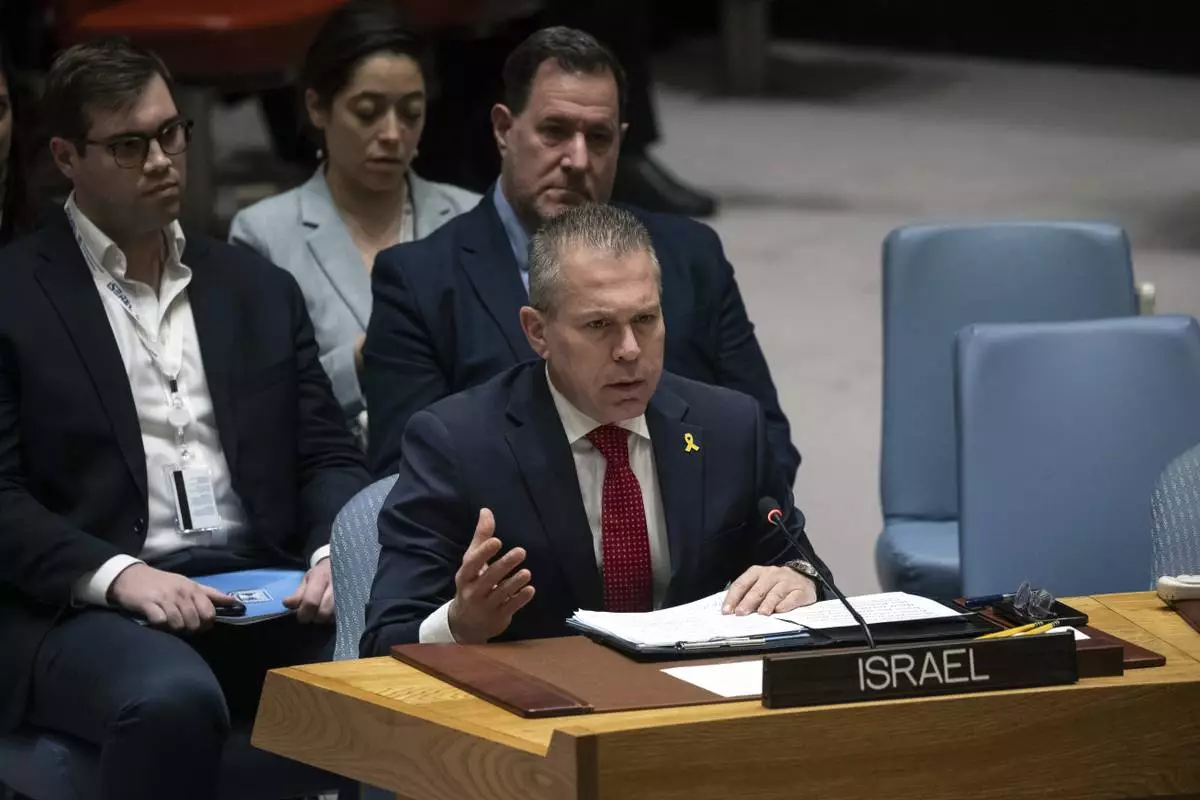
Israeli Ambassador to the United Nations Gilad Erdan speaks during a Security Council meeting at United Nations headquarters, Thursday, April 18, 2024. (AP Photo/Yuki Iwamura)
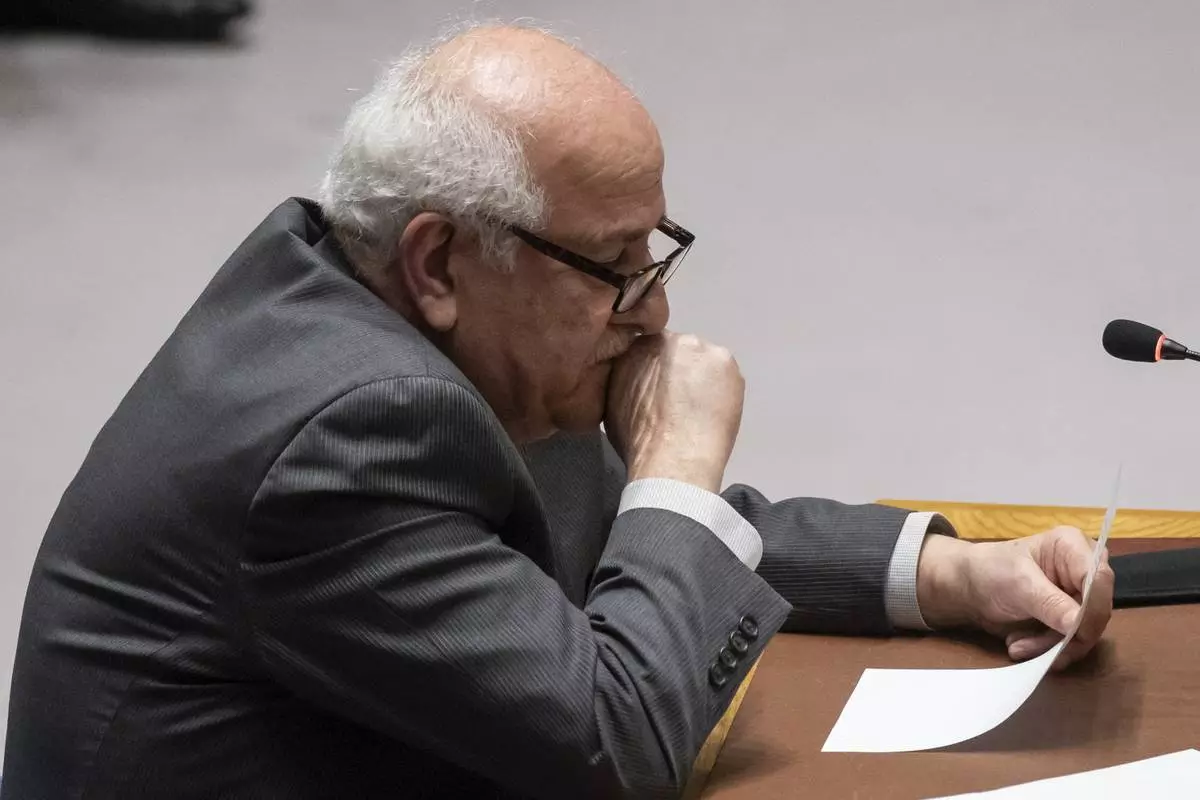
Palestinian Ambassador to the United Nations Riyad Mansour holds tears while speaking during a Security Council meeting at United Nations headquarters, Thursday, April 18, 2024. (AP Photo/Yuki Iwamura)
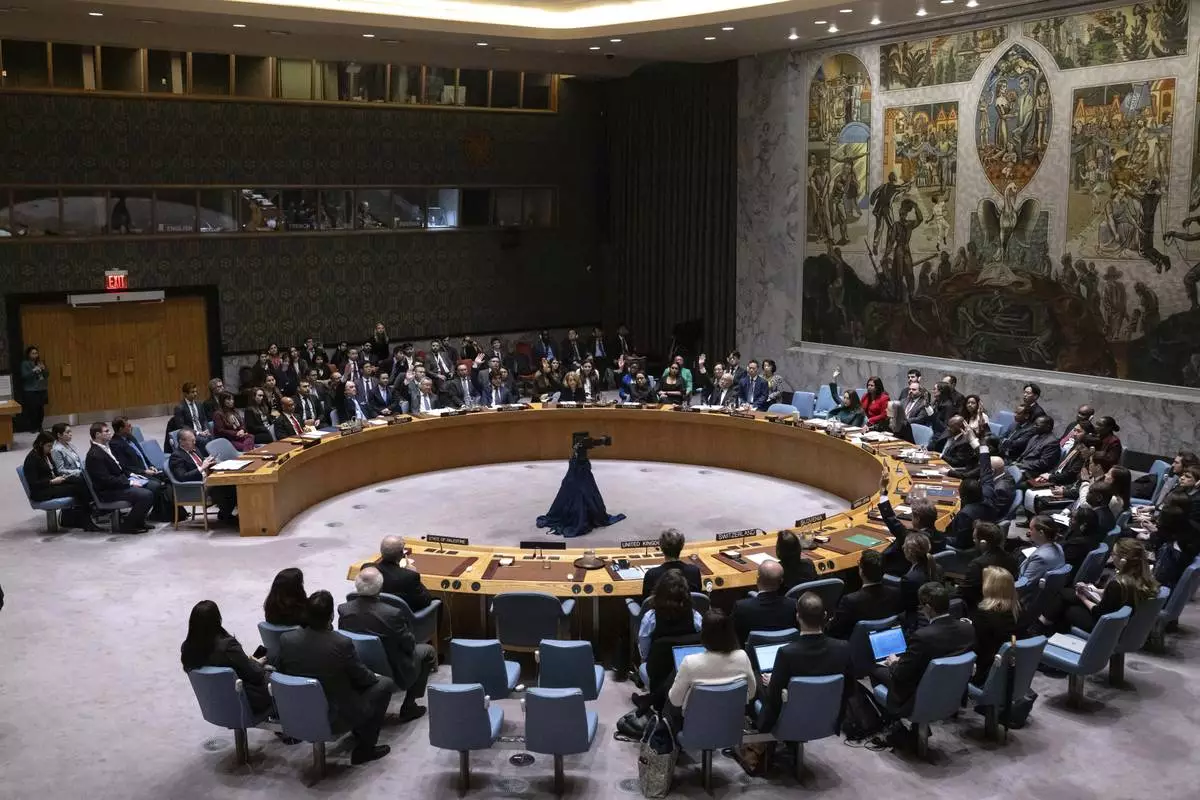
Representatives of member countries take votes during a Security Council meeting at United Nations headquarters, Thursday, April 18, 2024. (AP Photo/Yuki Iwamura)
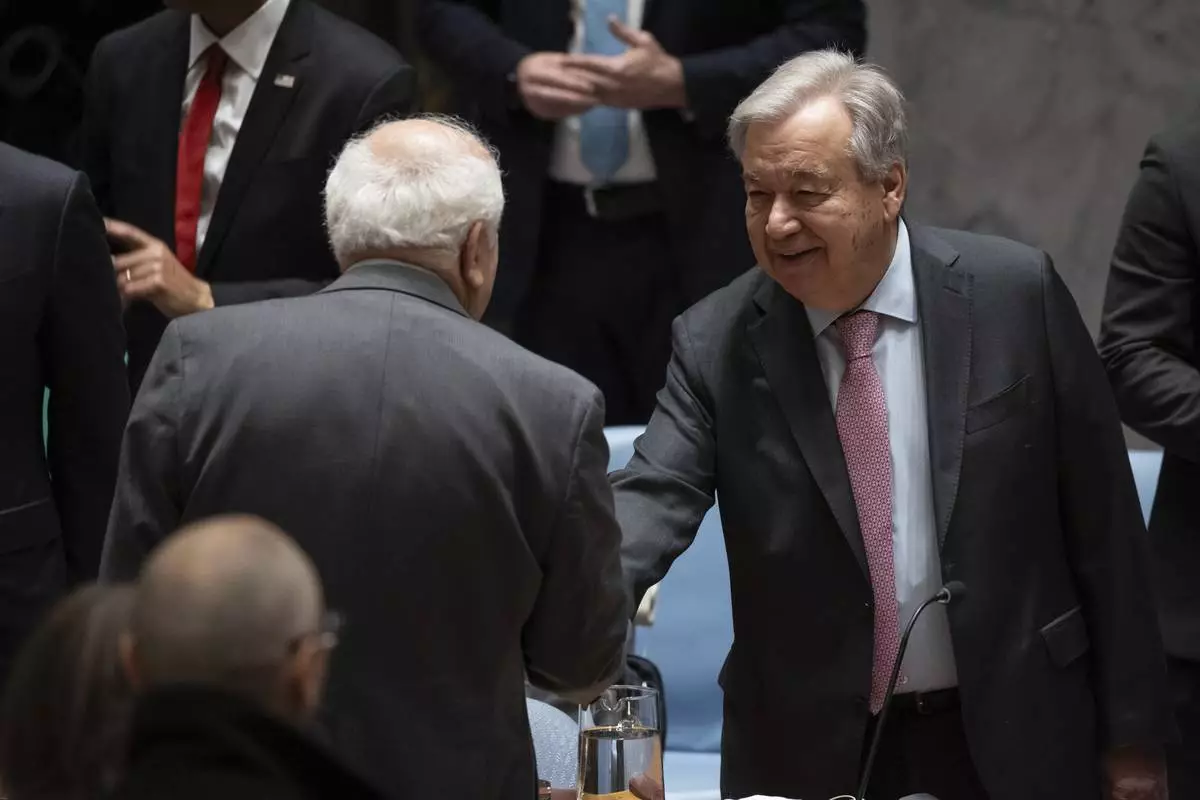
Palestinian Ambassador to the United Nations Riyad Mansour, left, and United Nations Secretary-General Antonio Guterres speak before a Security Council meeting at the United Nations headquarters, Thursday, April 18, 2024. (AP Photo/Yuki Iwamura)
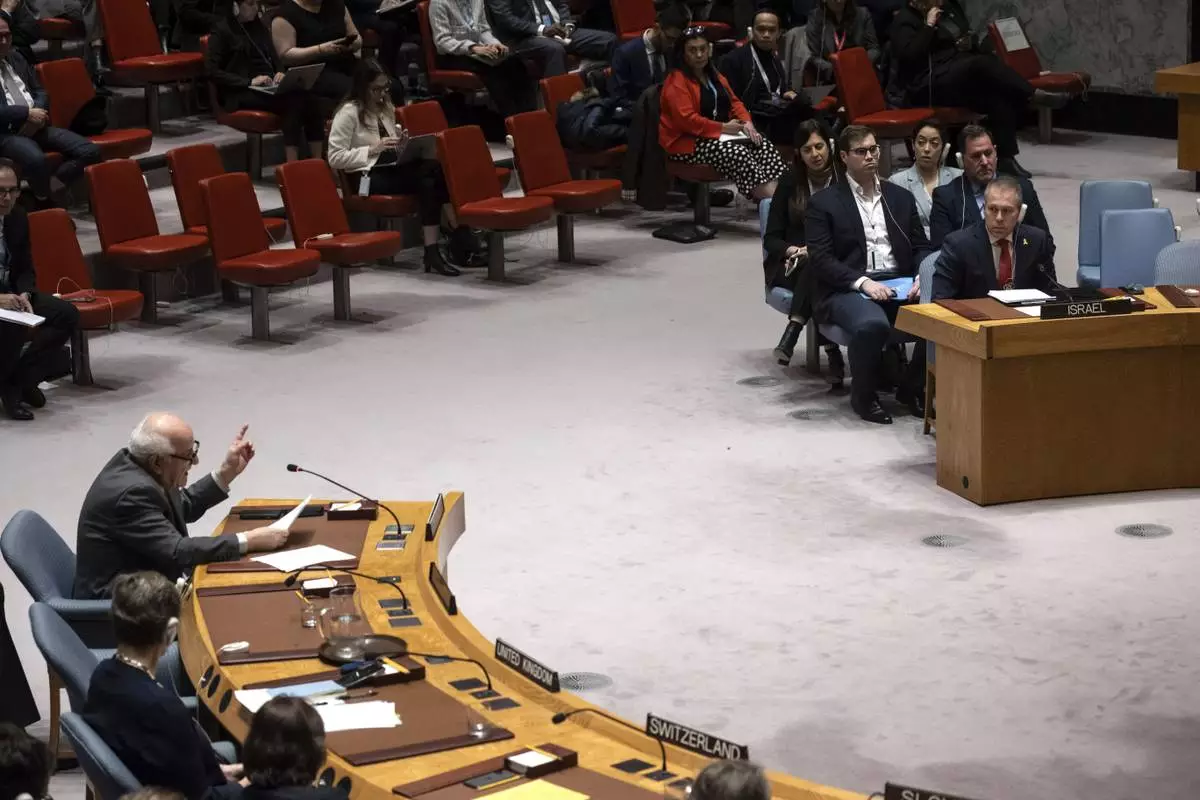
Palestinian Ambassador to the United Nations Riyad Mansour speaks during a Security Council meeting at United Nations headquarters, Thursday, April 18, 2024. (AP Photo/Yuki Iwamura)
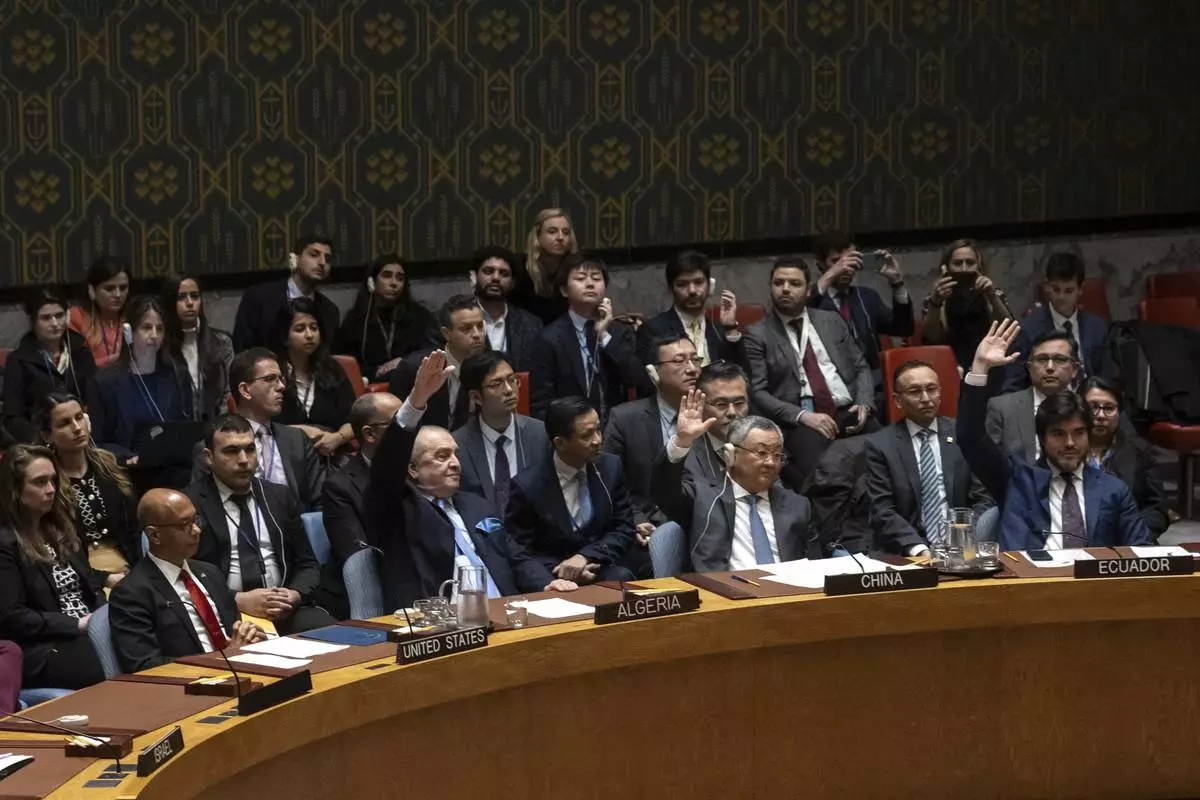
Representatives of member countries take votes during a Security Council meeting at United Nations headquarters, Thursday, April 18, 2024. (AP Photo/Yuki Iwamura)
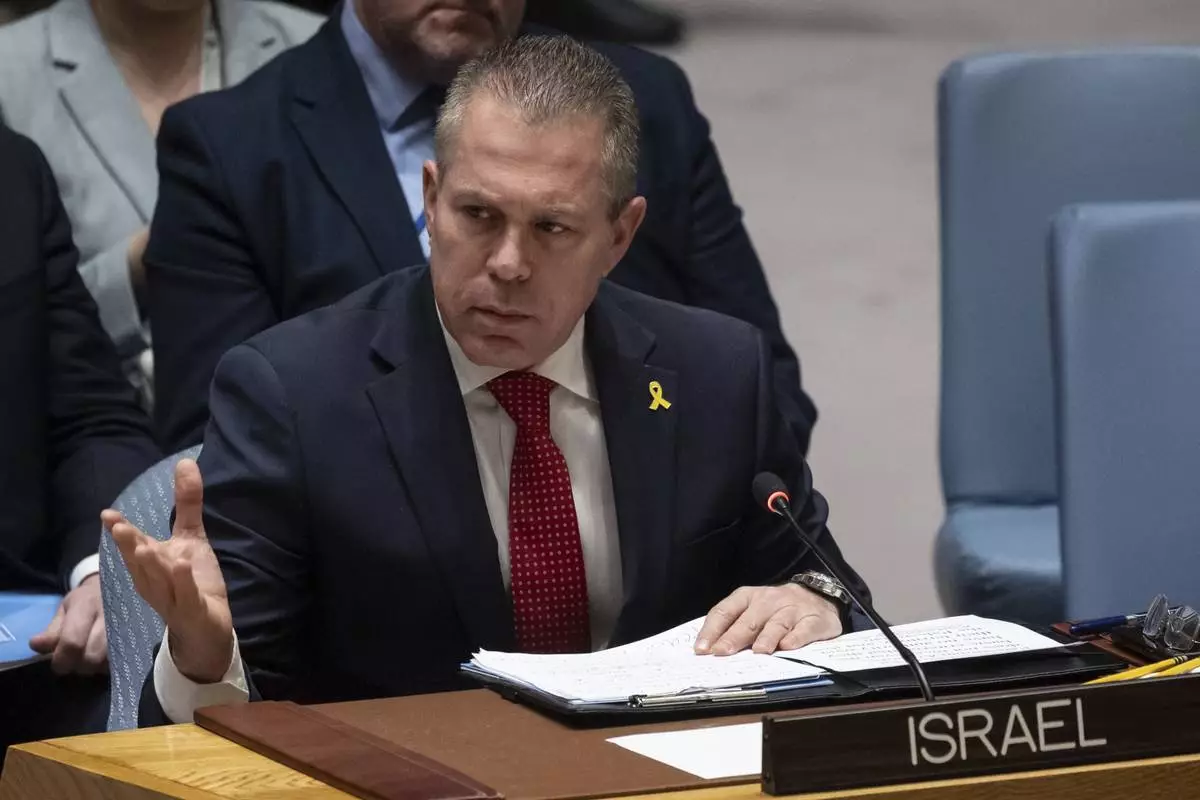
Israeli Ambassador to the United Nations Gilad Erdan speaks during a Security Council meeting at United Nations headquarters, Thursday, April 18, 2024. (AP Photo/Yuki Iwamura)
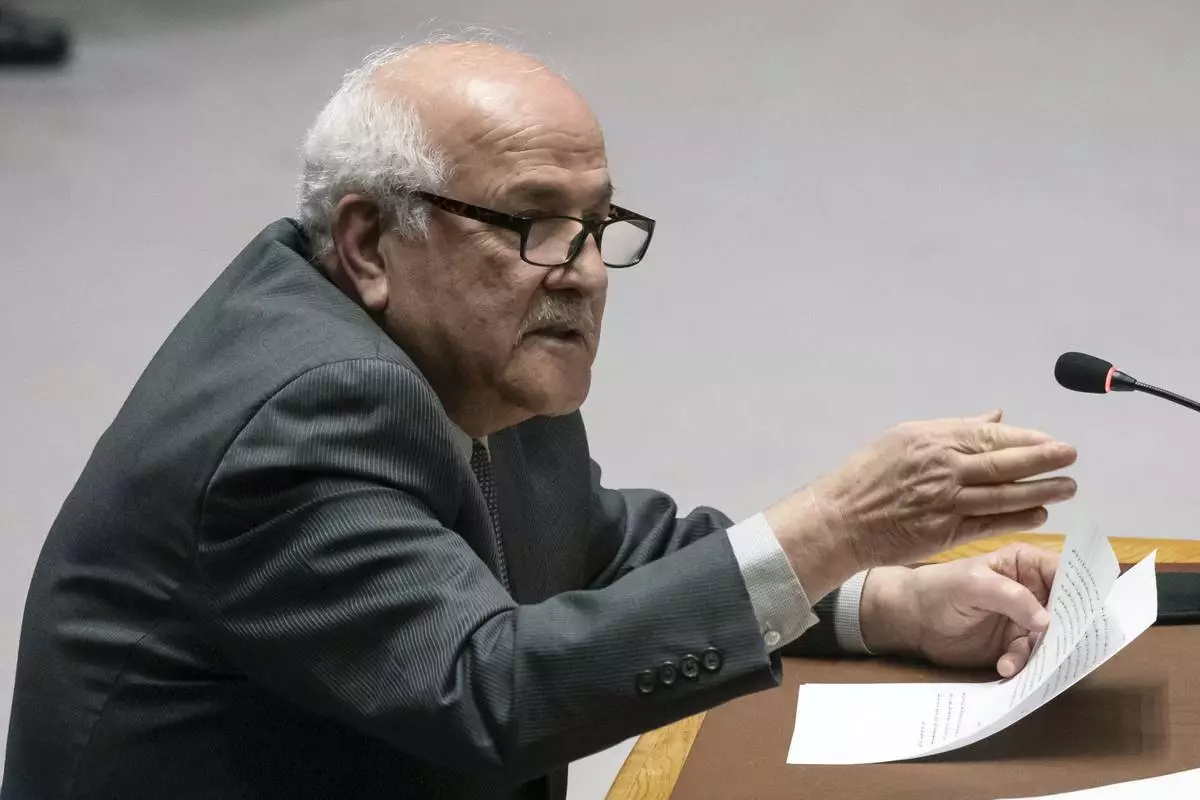
Palestinian Ambassador to the United Nations Riyad Mansour speaks during a Security Council meeting at United Nations headquarters, Thursday, April 18, 2024. (AP Photo/Yuki Iwamura)
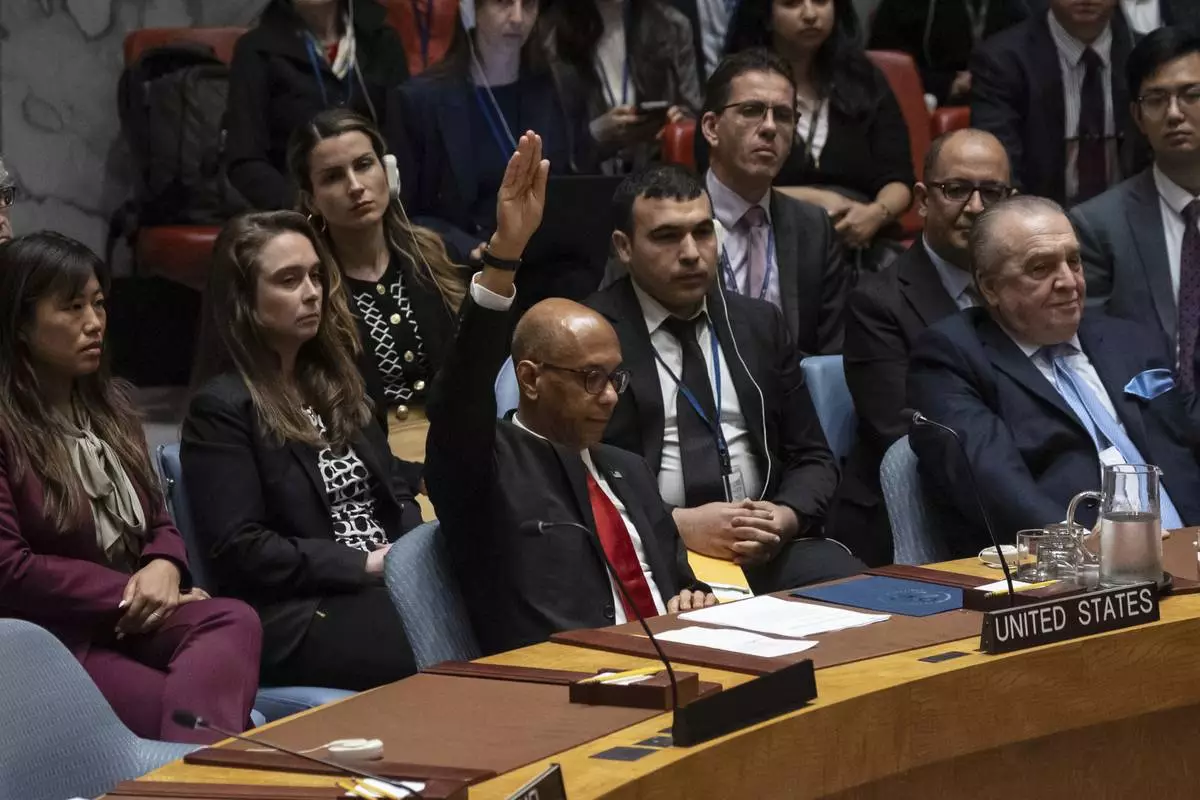
U.S. Deputy Ambassador Robert Wood votes against resolution during a Security Council meeting at United Nations headquarters, Thursday, April 18, 2024. (AP Photo/Yuki Iwamura)



















